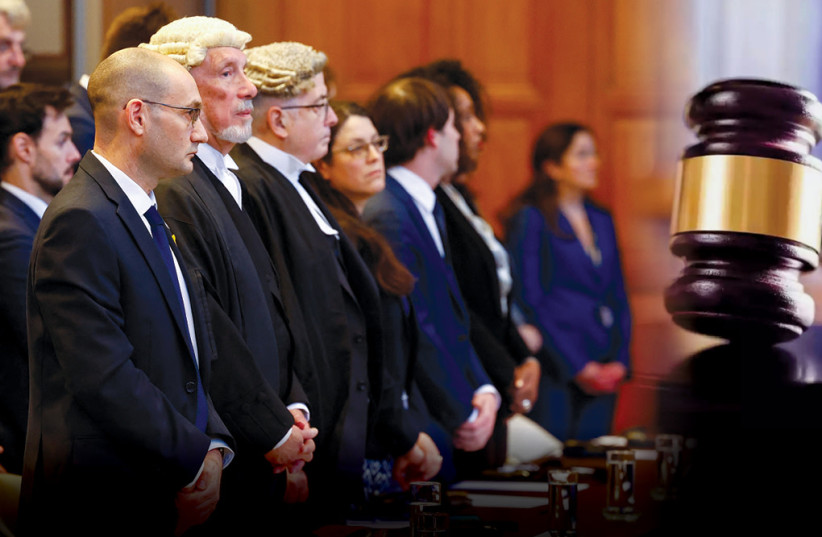Israel doesn’t have veto power on Palestinian statehood, PA tells ICJ
Palestinians have an inalienable right to statehood that must not be denied by Israel, Palestinian Authority Foreign Minister Riyad al-Maliki told the International Court of Justice on Monday.
“The Palestinian people have a right to self-determination that is non-negotiable,” Maliki said, adding that “no occupying power including Israel can be granted a perpetual veto” over the statehood of another people.
He spoke at the start of a six-day hearing on whether Israel’s “occupation” of the West Bank, Gaza, and east Jerusalem is illegal.
The “acquisition of territory by force” and the “denial of self-determination are all grave violations of international law,” and there is “a legal and moral obligation to bring the occupation to a prompt end,” Maliki said.
Legal expert Phillipe Sands explained to the court that Israel must be ordered to end its occupation of Palestinian territory.

“The existence and exercise of the right to self determination are not conditional,” he said, adding that security concerns cannot be used as a pretext to deny those rights. “It cannot be a matter of negotiation.”
The consequence of the denial of those rights, Sands warned, is that all UN member states must force an end to the occupations by halting relations with Israel. “No aid, no assistance, no complicity, no contribution to forcible acorn, no money, no arms, no trade, no nothing.
“All UN members are obliged by law to end Israel’s presence on the territory of Palestine. Period,” Sands stated.
“The political context is not relevant.”
Who the ICJ is expected to hear from
The ICJ is expected to hear half-hour statements from 49 countries and three international organizations, in addition to the PA’s three-hour legal argument presented Monday.
The “occupation” hearing runs simultaneously to a second ICJ case examining whether or not the IDF’s military campaign against Hamas in Gaza is tantamount to “genocide.”
In that later case, South Africa brought the case to the court in response to the Israel-Hamas war. The ICJ has the power to issue a binding ruling.
The “occupation” case, however, involves a non-binding advisory opinion. It was sent to the court last year, before the war, at the request of the United Nations General Assembly and would always have received a fast-tracked hearing date.
The ICJ advisory opinion, however, can be used as the basis for diplomatic action against Israel or to strengthen bidding international action against the Jewish state.
Timing-wise, the ICJ is hearing the case at a time when Western countries are weighing unilateral Palestinian statehood recognition as part of a renewed two-state peace process.
Israel’s government on Sunday night issued a statement rejecting unilateral Palestinian statehood recognition, insisting that such a move could only occur through a negotiated peace process. The Knesset is expected to ratify that declaration later on Monday.
Israeli leaders have long disputed the claim that the West Bank, Gaza, and east Jerusalem met the status of formal occupation on the basis that they were captured from Jordan and Egypt during the 1967 Six Day War rather than from a sovereign Palestine.
An ICJ advisory opinion in 2004, however, clarified that territories Israel captured during the 1967 war were considered to be “occupied” under international law.
Israel has been boycotting the proceedings at The Hague this week, arguing that they are biased against Israel and that the ICJ has no purview to hear the matter.
The United States and several other countries are expected to argue against an ICJ advisory opinion on the matter.
The UNGA had asked the judges to review Israel’s “occupation, settlement and annexation … including measures aimed at altering the demographic composition, character, and status of the Holy City of Jerusalem, and from its adoption of related discriminatory legislation and measures.”
Among countries scheduled to participate in the hearings are the United States – Israel’s strongest supporter – China, Russia, South Africa, and Egypt. Israel will not participate, although it has sent written observations.
The UNGA also asked the ICJ’s 15-judge panel to advise on how those policies and practices “affect the legal status of the occupation” and what legal consequences arise for all countries and the United Nations from this status.
The judges are expected to take several months to deliberate before issuing their opinion.
Reuters contributed to this report.





Comments are closed.